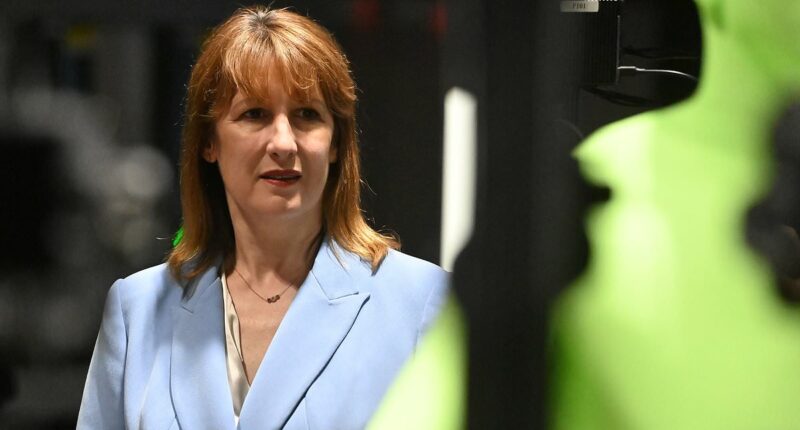Share this @internewscast.com
UK inflation increased more than anticipated last month, driven by a surge in demand for summer travel which elevated airfares, while food prices continued to rise, according to the latest official data.
The Consumer Prices Index (CPI) inflation climbed to 3.8% in July, up from 3.6% in June, as reported by the Office for National Statistics (ONS).
Most economists had predicted a rise in inflation to 3.7%, yet the actual rate matched the highest level seen since January 2024, when it reached 4%.
Despite the rate being significantly lower than the 11.1% peak attained in October 2022, last month’s figure is nearly double the Bank of England’s target of 2%.
The primary contributor to the rise in overall inflation last month was transport costs, notably due to an increase in flight prices as families planned their summer holiday travel during school break.
The ONS said air fares soared by 30.2 per cent between June and July, the biggest jump since the collection of monthly data began in 2001.
Petrol prices increased by an average of 2p per litre between June and July, while diesel prices rose by 2.9p per litre during the same period, the data indicated.
Prices across UK restaurants and hotels also increased last month, largely driven by a jump in overnight hotel stays booked the night before.

Chancellor Rachel Reeves, pictured during a visit to Studio Ulster in Belfast on August 12

Annual motor fuel price deflation for 12th consecutive month

The rate of inflation is now at nearly double the Bank of England’s 2 per cent target
Food and drink inflation rose to 4.9 per cent in July, from 4.5 per cent in June.
This marked the fourth month in a row that the annual rate had increased and remained at the highest level since February 2024.
ONS chief economist Grant Fitzner said: ‘The main driver was a hefty increase in air fares, the largest July rise since collection of air fares changed from quarterly to monthly in 2001.
‘This increase was likely due to the timing of this year’s school holidays. The price of petrol and diesel also increased this month, compared with a drop this time last year.
‘Food price inflation continues to climb – with items such as coffee, fresh orange juice, meat and chocolate seeing the biggest rises.’
Chancellor Rachel Reeves said: ‘We have taken the decisions needed to stabilise the public finances, and we’re a long way from the double-digit inflation we saw under the previous government, but there’s more to do to ease the cost of living.
‘That’s why we’ve raised the minimum wage, extended the £3 bus fare cap, expanded free school meals to over half a million more children, and are rolling out free breakfast clubs for every child in the country.
‘Through our Plan for Change we’re going further and faster to put more money in people’s pockets.’
Shadow chancellor Sir Mel Stride MP said: ‘This morning’s news that inflation has risen even higher than the 2 per cent target is deeply worrying for families.
‘Labour’s choices to tax jobs and ramp up borrowing are pushing up costs and stoking inflation – making everyday essentials more expensive.
‘And with leading economists warning that the Chancellor has blown a colossal black hole in the public finances, families and businesses are bracing for yet more pain come the Autumn Budget.
‘Families are paying the price for Rachel Reeves’ economic mismanagement. Britain can’t afford Labour.’
And shadow business secretary Andrew Griffith added: ‘The fault for this inflation lies squarely in Downing Street. Labour’s jobs tax, rates hikes and minimum wage rises have all fed through to higher prices – just as predicted.
‘This should give the Chancellor real pause for thought before inflicting any more tax rises this autumn.’
Meanwhile Liberal Democrat Treasury spokesperson Daisy Cooper said: ‘Rising inflation is grim news for families, pensioners and businesses still struggling with the cost-of-living crisis.
‘After the Conservative Government oversaw the biggest fall in living standards on record, people desperately need things to change.
‘But, so far, Labour has failed to offer a vision for the economy or a strategy to bring down the cost of living.
‘The Chancellor needs to take far bolder action, starting with the Liberal Democrat plan to halve energy bills by 2035.’
Kris Hamer, director of insight at the British Retail Consortium, said: ‘Households are once again seeing the cost of their weekly shop climb, with food inflation now up by 1.9 percentage points in just four months.
‘This surge has been a key driver behind headline inflation, alongside a rise in transport costs, piling fresh pressure on families already being forced to cut back.

Food and non-alcoholic beverages annual inflation rate highest since February 2024

CPIH goods annual inflation at its highest rate since October 2023, while services inflation at its joint lowest rate since January 2023

Housing and household services made the largest positive contribution to the CPIH annual inflation rate
‘The Bank of England has been clear that government policies, which have driven up the costs of employment, are fuelling price rises at the till, while poor harvests and global instability have also added further cost pressures.’
He added that there was some ‘limited relief’ for consumers with clothing and footwear inflation easing and some everyday food items like olive oil, butter and cheese falling month-on-month.
The Bank of England is expecting CPI inflation to continue rising to a peak of 4 per cent in September, before price rises start to ease.
The central bank is tasked with keeping inflation at 2 per cent.
Elliott Jordan-Doak, senior UK economist for Pantheon Macroeconomics, suggested the Bank’s policymakers could be concerned by rising inflation in the UK services sector, but that it was ‘partly driven by a sharp move in the erratic airfares component, which could unwind in August’s data’.
The annual rate of services CPI inflation rose to 5 per cent in July from 4.7 per cent in June.
‘The big picture remains that inflation is set to stay miles above target for the foreseeable future,’ he said.

CPI goods annual inflation rate at its highest since October 2023

Transport led the upward contributions to change in CPI annual inflation

Housing and household services led the positive contributions to the CPI annual inflation rate
The economist is forecasting that CPI will remain above 3 per cent until April 2026, meaning the Bank could keep interest rates on hold for the rest of the year.
Elsewhere, the data showed the ONS’s preferred measure of inflation, Consumer Prices Index including owner occupiers’ housing (CPIH), rose to 4.2 per cent in July from 4.1 per cent in June.
The Retail Prices Index (RPI) rate of inflation rose to 4.8 per cent last month from 4.4% in June.
This figure could be used to calculate how much regulated train fares in England will rise by next year.

















